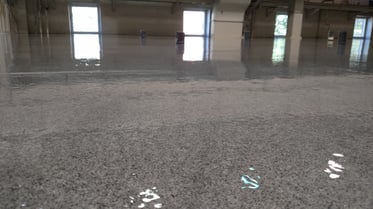
As in any specialized field, there are lots of misconceptions about industrial floor coatings. Oftentimes people confuse facts, mix up product types, or just buy into “common knowledge” that is anything but knowledgeable.
To clear up these misconceptions and help people decide if industrial floor coatings are right for their commercial or industrial facilities, here are some of the most common myths about industrial floor coatings dispelled:
Myth #1: Industrial Floor Coatings Aren’t Worth the Expense
If you oversee a facility such as a manufacturing or pharmaceutical plant that places a lot of stress on your floors, applying a protective coating is often cheaper in the long run. It’s easier to replace a coating than to repair an uncoated floor that’s been severely damaged.
But sometimes a bad salesman can give a legitimate product a bad name. Perhaps you or another facility manager you know ended up paying a premium price for a floor coating that was actually overkill for what the facility actually needed.
Of course, there are cases in which an extreme chemical-resistant, USDA-grade, or other highly specialized floor coating is worth the investment. But for other facilities, a basic epoxy installation may be all that is needed.
For this reason, we recommend working with a floor coating company that offers a variety of products—not just a single brand that they’re likely to upsell you on. A floor coating contractor that offers multiple solutions can help you find exactly what you need, given your budget and the conditions of the site in question.
You may be surprised to find out that industrial floor coatings cost far less than you anticipated, or that even bumping up to the next level of product will actually save you money in the long run.
MYTH #2: D.I.Y. Is Just as Good
In skilled hands, a do-it-yourself industrial floor coating application can have almost as much quality as a professional application. The reality, though, is that most people do not anticipate the huge amount of work it takes to apply an industrial floor coating.
Worse, their lack of knowledge can lead to failed adhesion, meaning the coating must be replaced within a few short years or months. Some coatings failures require immediate replacement. Even more concerning, the products and equipment involved in some industrial floor coating applications can lead to significant health hazards to anyone performing the process without the right protection.
Unless you have experience applying a coating, have it installed properly and safely the first time by a professional.
MYTH #3: A Floor Coating Is Just Like Paint
While in some cases a coat of paint is all that a concrete floor needs, most paint will not stand up to vehicle traffic, impacts, exposure to manufacturing equipment, and even a high volume of foot traffic. Most paint will peel when subjected to the demands of most industrial environments.
A floor coating, on the other hand, forms a strong chemical adhesion bond with the surface of the concrete or hard flooring. This layer actually strengthens the floor while adding a flexible topcoat that can respond to impact and the weight of heavy machinery.
If you’re looking for an eye-catching finish (or would like to implement a 5S floor striping system for better organization), you can choose from a number of colorful and decorative coating options.
MYTH #4: Sweeping and Mopping the Floor Counts as Surface Preparation
Proper surface preparation is, in many ways, the most important step of industrial floor coating applications. The surface must be clean, cleared of oils or chemical residues, and prepared with equipment that etches out a rough texture for the coating to adhere to.
Sweeping and mopping is just the first and most basic step of preparation. In some circumstances, basic surface contaminants that haven't been cleared can actually be pushed deeper into the floor during installation. And these contaminants can compromise the coating’s ability to bond with the flooring, causing bubbles, blisters, and peeling.
Careful and professional surface preparation is the best way to guarantee a longer-lasting, better-performing floor coating.
More information
If you’d like to learn more about industrial floor coatings, check out these related articles:

